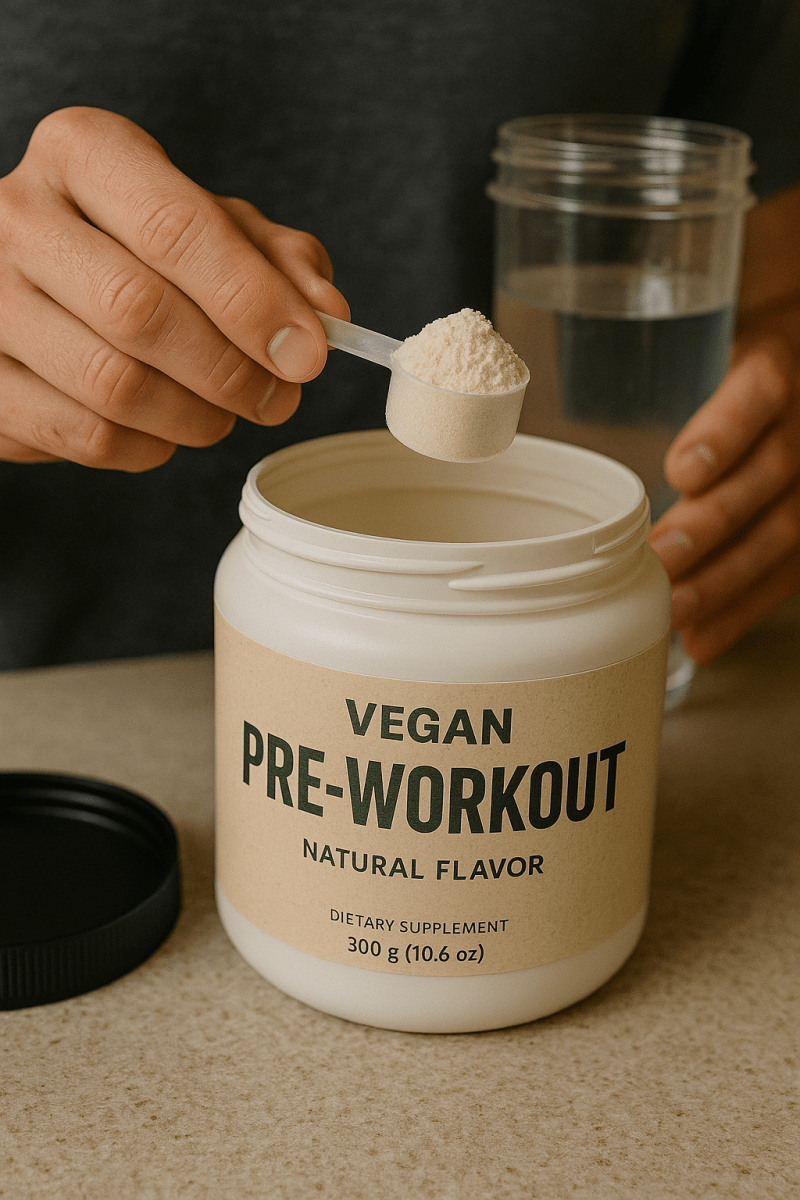
What Is Pre Workout Meal [2025 Guide]
Getting the most out of your training session is about more than just turning up and grinding through reps. What you eat before you set foot in the gym can have a massive impact on your energy, focus, and overall performance. So, what is pre workout meal, and why does it matter for your fitness goals?
A pre workout meal is the food you eat before exercise, usually within a few hours of training. Its purpose is to fuel your body, maximise your workout potential, and protect your muscles. Think of it as the foundation that supports your lifts, sprints, or extended cardio sessions. Choosing a good pre workout meal isn’t just about eating anything — it’s about providing the right balance of nutrients to help you power through without feeling sluggish or fatigued.
This article will cover everything you need to know: what makes an effective pre workout meal, when to eat it, and how to tailor your nutrition if muscle gain or fat loss is your goal. You’ll also find expert-backed advice and tips rooted in UK health guidelines to help you crush your next session with confidence and energy.
The Science Behind Pre Workout Nutrition
Key Macronutrients for a Good Pre Workout Meal
When it comes to pre workout meals, macros matter. The combination of carbohydrates, protein, and fats influences your performance in different ways:
- Carbohydrates: The body’s main energy source, carbs are essential for fuelling short and high-intensity workouts. They help maintain blood sugar levels and top up glycogen stores, which are depleted during exercise. According to the NHS, including starchy foods like rice, oats, or wholemeal bread helps keep energy consistent.

- Protein: Including some protein before training provides the building blocks (amino acids) that your muscles need to repair and grow. This is especially important if your focus is on resistance training or muscle gain. The British Nutrition Foundation recommends lean protein sources as part of a balanced meal.
- Fats: A small amount of healthy fats can add to overall satisfaction and help slow digestion, but too much may leave you feeling sluggish. Focus on quality sources in moderate amounts to avoid tummy discomfort during intense sessions.
Timing Your Pre Workout Meal
Timing is just as important as your food choices. As a general rule, aim to eat your pre workout meal 1.5 to 3 hours before training. This window allows your body to digest and absorb nutrients while keeping you comfortable and energised during your workout.
If you’re training early or don’t have much time, a smaller snack packed with carbs and a bit of protein 30–60 minutes before your session could do the trick. Think light and easy to digest to avoid cramps or bloating.
Ultimately, what’s a good pre workout meal is personal — listen to your body, and experiment with timing to figure out what works best for you.

What’s a Good Pre Workout Meal?
Crafting a good pre workout meal comes down to balancing convenience, digestion, and nutrition. Try to tailor your portion size and food choices to your exercise intensity and goals. Here are some practical options for a pre-exercise meal:
- Carbohydrates: Prioritise easy, familiar carb sources like wholemeal toast, brown rice, pasta, or fruit. These offer sustained energy and replenish your muscle glycogen.
- Protein: Aim for a lean source that you tolerate well (like eggs, Greek yogurt, or a plant-based option) to kick off muscle repair before you even start lifting or running.
- Hydration: Being well-hydrated is essential. According to the Sport England Nutrition Guide, drinking water with your pre workout meal and during exercise keeps performance at its best.
- Fats: If you tolerate fats well, include a small amount from nuts, seeds, or avocado, but don’t go overboard.
If you’re looking for inspiration or have specific dietary needs, check out high-protein meal prep ideas for quick fixes that deliver both protein and complex carbs.
Common Mistakes and How to Avoid Them
- Skipping the meal altogether: Fasted workouts don’t suit everyone and may leave you underpowered, especially for strength or hypertrophy sessions.
- Overloading fats or fibre: While these offer benefits, too much pre-workout can slow digestion and make you uncomfortable during explosive movements.
- Drinking too little water: Even mild dehydration will affect your strength, focus, and stamina.
- Trying new foods on training day: Stick to tried-and-tested choices to avoid stomach problems during intense workouts.
Building Your Pre Workout Meal for Muscle Gain, Endurance, or Fat Loss
If your main goal is muscle gain, your pre workout meal should support protein synthesis and glycogen replenishment. Here’s what the research and UK guidelines suggest:
- Consume both protein and carbohydrates before your workout to stimulate muscle protein synthesis and fuel tough sessions.
- Focus on high-quality proteins and low-to-moderate glycaemic carbs to avoid a rapid crash in energy.
- Keep your portions moderate; aim to feel energised, not stuffed.
Looking to nail your nutritional prep? Explore more healthy meal prep ideas for performance and muscle building.
Pre Workout Meal for Fat Loss or Weight Management
If weight loss is your priority, you’ll want a pre workout meal that provides fuel but keeps calories in check. The focus should be on lean protein and slow-release carbs, with minimal added sugars or processed fats. This approach helps maintain energy without causing a calorie surplus or energy slump mid-session.
For structures that support fat loss, check out meal prep ideas for weight loss created specifically for keeping meals balanced and satisfying, while aligning with your goals.
Pre Workout for Endurance Training
Endurance training — think long runs, cycling, or HIIT — requires steady, long-lasting fuel. A larger meal of low-GI carbs, a moderate amount of lean protein, and a small amount of fat helps you sustain energy and stave off fatigue.
Choose familiar foods over fancy options. This helps ensure your stomach can handle the session and that you’re not distracted by digestive discomfort during tough training blocks or races.
Expert Tips: Pre Workout Meal FAQ and Troubleshooting
- How soon should I eat before training? Ideally 1.5–3 hours before your session, depending on your metabolism and intensity. For early-morning training, a small snack 30–60 minutes before may suffice.
- Can I train fasted? Some can, especially for low-intensity sessions, but most will benefit from a good pre workout meal, especially when lifting heavy or aiming to build muscle.
- What about supplements? Start with whole foods first. Supplements like pre-workout drinks aren’t necessary unless you’ve already dialled in your nutrition, hydration, and recovery.
- How do I avoid bloating? Stick to familiar, easy-to-digest foods. Go easy on high-fibre veg, beans, fatty foods, and avoid anything unfamiliar on key training days.
Troubleshooting Common Pre Workout Problems
Struggling with low energy, poor focus, or stomach issues? These quick checks may help:
- Low energy or hunger: Increase carbs, adjust timing, or add a little more protein.
- Stomach cramps or nausea: Eat sooner before training, choose lighter foods, and limit heavy fats/fibre.
- Feeling too full: Eat a smaller meal, further away from your training time.
Remember, what’s a good pre workout meal is partly personal. Your training time, metabolism, and goals will shape the best meal for you.

Nailing your pre workout nutrition can be the game-changer in your training progress. Understanding what is pre workout meal and why it matters means you’ll arrive at each session energised, focused, and ready to perform at your best.
The fundamentals stay the same: build a meal with easy-to-digest carbs and protein, go light on fats and fibre, and time it so you’re neither ravenous nor uncomfortably full. Your pre workout meal for muscle gain should prioritise protein and carbs, while meals for weight loss are about keeping things lean and controlled.
What Is Pre Workout Meal FAQ's
1. What is the best time to eat a pre workout meal?
The ideal time to eat a pre workout meal is 1.5 to 3 hours before training, giving your body time to digest and absorb nutrients. If you’re training early or on a tight schedule, a smaller snack 30–60 minutes before can still give you an energy boost without causing discomfort.
2. What should I eat before a workout for muscle gain?
For muscle gain, focus on a balanced meal with both protein and carbohydrates. Lean protein (like eggs, Greek yogurt, or tofu) supports muscle repair, while complex carbs (like oats or brown rice) fuel your session. Avoid high-fat foods close to training, as they may slow digestion.
3. Can I work out on an empty stomach?
It depends. Fasted training can work for some, especially during light cardio. But if your goal is strength or hypertrophy, eating beforehand helps boost performance and protect muscle mass. Try a light snack if a full meal isn’t practical.
4. What are some good pre workout snacks if I’m short on time?
Quick, effective snacks include:
-
A banana with a spoon of nut butter
-
Rice cakes with hummus
-
A protein shake with oats
-
Low-fat yogurt with fruit
5. How can I avoid feeling bloated before a workout?
-
Eat 1.5–3 hours before training
-
Avoid high-fat or high-fibre foods close to your session
-
Stick to familiar foods and avoid experimenting on training days
-
Stay hydrated, but don’t overdo water right before lifting or cardio

![Pre Workout Meal For Muscle Gain [2025 Guide]](http://repworld.co.uk/cdn/shop/articles/pre-workout-meal-for-muscle-gain-2025-guide-5582916.jpg?v=1752639629&width=800)
